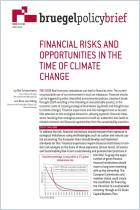
The Case for a Supply-Side Climate Treaty
The Paris Agreement can be strengthened by a treaty limiting global fossil fuel supply
Recommendation
Decades of efforts to avert the global climate crisis by reducing demand for fossil fuels have been discouragingly ineffective. Reduced demand in one place causes prices to drop, stimulating demand somewhere else. This intriguing paper by a team of European researchers offers new hope for those discouraged by the impasse by suggesting that if a number of countries agreed to cap fossil fuel production, the price signals that result could counterbalance demand-side efforts’ fatal flaws and motivate the development of low-carbon technologies at relatively little cost.
Summary
About the Authors
The nine authors, G.B. Asheim, T. Fæhn, K. Nyborg, M. Graeker, C. Hagem, B. Harstad, M.O. Hoel, D. Lund and K.E. Rosendahl, are part of the Oslo Centre for Research on Environmentally Friendly Energy at the University of Oslo in Oslo, Norway.


















Comment on this summary